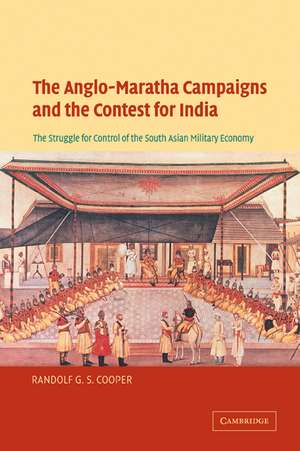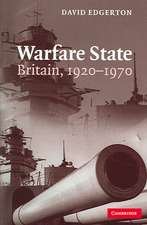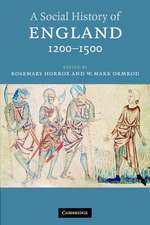The Anglo-Maratha Campaigns and the Contest for India: The Struggle for Control of the South Asian Military Economy
Autor Randolf G. S. Cooperen Limba Engleză Paperback – 30 mai 2007
| Toate formatele și edițiile | Preț | Express |
|---|---|---|
| Paperback (1) | 440.96 lei 6-8 săpt. | |
| Cambridge University Press – 30 mai 2007 | 440.96 lei 6-8 săpt. | |
| Hardback (1) | 872.85 lei 6-8 săpt. | |
| Cambridge University Press – 11 feb 2004 | 872.85 lei 6-8 săpt. |
Preț: 440.96 lei
Nou
Puncte Express: 661
Preț estimativ în valută:
84.39€ • 87.60$ • 70.37£
84.39€ • 87.60$ • 70.37£
Carte tipărită la comandă
Livrare economică 24 martie-07 aprilie
Preluare comenzi: 021 569.72.76
Specificații
ISBN-13: 9780521036467
ISBN-10: 0521036461
Pagini: 456
Ilustrații: 11 maps
Dimensiuni: 152 x 228 x 28 mm
Greutate: 0.66 kg
Editura: Cambridge University Press
Colecția Cambridge University Press
Locul publicării:Cambridge, United Kingdom
ISBN-10: 0521036461
Pagini: 456
Ilustrații: 11 maps
Dimensiuni: 152 x 228 x 28 mm
Greutate: 0.66 kg
Editura: Cambridge University Press
Colecția Cambridge University Press
Locul publicării:Cambridge, United Kingdom
Cuprins
List of maps; Acknowledgements; A note on transliteration and references; List of abbreviations used in the references; Introduction; 1. Maratha military culture; 2. British perceptions and the road to war in 1803; 3. The Deccan campaign of 1803; 4. The Hindustan campaign of 1803; 5. 'Coming in'; 6. The anatomy of victory; Appendix I: chronology of Anglo-South Asian wars; Appendix II: British troop strengths and casualties for the Hindustan and Deccan campaigns 1803; Appendix III: Governor-General Wellesley's 'Maratha' proclamation of 1803; Appendix IV: mercenary pension records; Appendix V: the Marathas' employment of mercenaries in historic perspective; Glossary; Notes; Bibliography; Index.
Recenzii
'… it is unlikely that the author's analysis of that fascinating and turbulent period at the turn of the 19th century will be bettered for some considerable time … first modern analysis of the Anglo-Maratha wars … highly recommended.' Chowkidar
'Randolf Cooper's study of the Anglo-Maratha conflict of 1803 makes a valuable contribution to the new military history that examines not simply the development of warfare, but its complex interaction with wider technological, political, socio-economic and cultural factors.' Rusi Journal
'In short, drawing on a wide reading of British and Indian material, and displaying a commendable ability to understand the different military cultures of the combatants, this important book will not only be the leading work on its subject, but also one of more general interest.' The Journal of Military History
'In all this, Cooper skilfully combines his military scholarship with his insights into wider issues and into the unique features of the Indian polity, heavily dependent as it was on the dynamics of the South Asian military economy. … this is no less than a revolutionary book. By convincingly explaining the E.I.C.'s conquest of India in the broader context of the South Asian military economy, it aims at the hard core of old imperial historiography and thus prepares the road to re-interpretations in the field of colonial history that are bound to do far more justice to the internal dynamics of Indian society than we have been able to do so far.' Itinerario
'… lucid and culturally-nuanced account of the key battles which comprised the Anglo-Maratha War of 1803–1805 … anyone interested in how the British succeeded on Indian battlefields would be well advised to consult this work …' Journal of Colonialism and Colonial History
'… brings out very interesting and revealing conclusions regarding the misconceptions perpetuated by the British authors about the Marathas … The book is a refreshing attempt at objective analysis of convenient stereotypes … highly recommended …' U.S.I. Journal
'The book constructs a useful model of the political economy of the Maratha wars to question the ethnocentric assumptions of British military superiority as well as the nationalistic explanations of the Maratha effect … He matches the rich details for almost every important battle in the period by an equally rigourous attempt to engage with the mooted issues of the transition to colonialism … In other words, whereas the book brings out the complexity of the Maratha military culture with remarkable insight, it essentialises and simplifies that of the British … The dexterous handling of the military archives that has enriched our understanding of the Maratha political culture.' Journal of Modern Asian Studies
'Randolf Cooper's study of the Anglo-Maratha conflict of 1803 makes a valuable contribution to the new military history that examines not simply the development of warfare, but its complex interaction with wider technological, political, socio-economic and cultural factors.' Rusi Journal
'In short, drawing on a wide reading of British and Indian material, and displaying a commendable ability to understand the different military cultures of the combatants, this important book will not only be the leading work on its subject, but also one of more general interest.' The Journal of Military History
'In all this, Cooper skilfully combines his military scholarship with his insights into wider issues and into the unique features of the Indian polity, heavily dependent as it was on the dynamics of the South Asian military economy. … this is no less than a revolutionary book. By convincingly explaining the E.I.C.'s conquest of India in the broader context of the South Asian military economy, it aims at the hard core of old imperial historiography and thus prepares the road to re-interpretations in the field of colonial history that are bound to do far more justice to the internal dynamics of Indian society than we have been able to do so far.' Itinerario
'… lucid and culturally-nuanced account of the key battles which comprised the Anglo-Maratha War of 1803–1805 … anyone interested in how the British succeeded on Indian battlefields would be well advised to consult this work …' Journal of Colonialism and Colonial History
'… brings out very interesting and revealing conclusions regarding the misconceptions perpetuated by the British authors about the Marathas … The book is a refreshing attempt at objective analysis of convenient stereotypes … highly recommended …' U.S.I. Journal
'The book constructs a useful model of the political economy of the Maratha wars to question the ethnocentric assumptions of British military superiority as well as the nationalistic explanations of the Maratha effect … He matches the rich details for almost every important battle in the period by an equally rigourous attempt to engage with the mooted issues of the transition to colonialism … In other words, whereas the book brings out the complexity of the Maratha military culture with remarkable insight, it essentialises and simplifies that of the British … The dexterous handling of the military archives that has enriched our understanding of the Maratha political culture.' Journal of Modern Asian Studies
Notă biografică
Descriere
A history of the last serious indigenous campaign against the formation of the British Raj.















